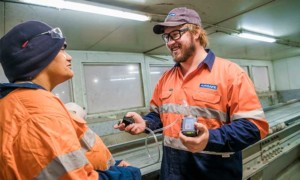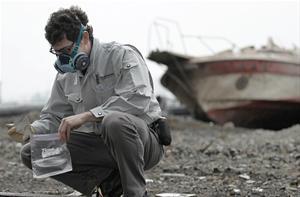Silica exposure has become a major concern for workers in many industries, including construction, mining, and manufacturing. Silica, also known as quartz, is a common mineral found in rocks, soil, and sand. When these materials are disturbed, such as during drilling, cutting, or grinding, silica particles can become airborne and be inhaled by workers. Prolonged exposure to silica can lead to serious health issues such as silicosis, lung cancer, and other respiratory diseases.

To protect workers from these harmful particles, employers are required to monitor the air quality in their workplaces and implement measures to control exposure. This includes conducting regular air monitoring to measure the concentration of silica particles in the air, as well as implementing engineering and administrative controls to limit worker exposure.
Air monitoring is a critical tool for assessing worker exposure to silica. By measuring the concentration of silica particles in the air, employers can determine if workers are at risk of overexposure and take appropriate steps to reduce their exposure. Air monitoring is typically conducted using specialized equipment such as personal air samplers, which are worn by workers to measure the amount of silica particles they are inhaling, or area air samplers, which are placed in specific locations to measure the concentration of silica in the air.

In addition to air monitoring, employers must also implement engineering and administrative controls to limit worker exposure to silica. Engineering controls include using tools and equipment that are designed to minimize the release of silica particles into the air, such as water suppression systems, dust collectors, and ventilation systems. Administrative controls include measures such as limiting worker exposure time, providing respiratory protection, and training workers on the hazards of silica exposure.
Safework Australia has established an exposure standard for silica to protect workers from the harmful effects of overexposure. The current exposure standard for silica is 50 micrograms per cubic meter of air, averaged over an eight-hour workday. Employers must ensure that their workers are not exposed to levels of silica above the exposure standard, and must take action to reduce exposure if levels exceed this limit.
Employers are also required to provide workers with respiratory protection if exposure to silica cannot be adequately controlled through engineering and administrative controls. Respiratory protection includes the use of respirators such as N95 masks, powered air-purifying respirators, or supplied-air respirators, depending on the level of exposure and the specific job tasks being performed.

Employers must also train their workers on the hazards of silica exposure and the measures in place to protect them. This training must cover topics such as the health effects of silica exposure, the proper use and maintenance of respiratory protection, and the importance of reporting any symptoms of illness related to silica exposure.
In addition to protecting workers, implementing measures to control silica exposure can also benefit employers by reducing healthcare costs, increasing productivity, and improving overall worker morale and satisfaction.
Air monitoring for silica exposure is a critical component of any workplace safety program. By monitoring the air quality in their workplaces and implementing measures to control exposure, employers can ensure that their workers are protected from the harmful effects of silica exposure. Workers have the right to work in a safe and healthy environment, and it is the responsibility of employers to provide this. By taking proactive steps to protect their workers from silica exposure, employers can create a safer and healthier workplace for all.
If you are concerned about silica exposure in your workplace, speak to your employer or occupational health and safety representative. They can provide information on the specific measures in place to protect workers from silica exposure, as well as any training or resources available to help you stay safe on the job.
Airsafe can also provide Respirable Crystalline Silica monitoring solutions.
For any questions about Respirable Crystalline Silica monitoring, call Airsafe on 1300 888 338.



